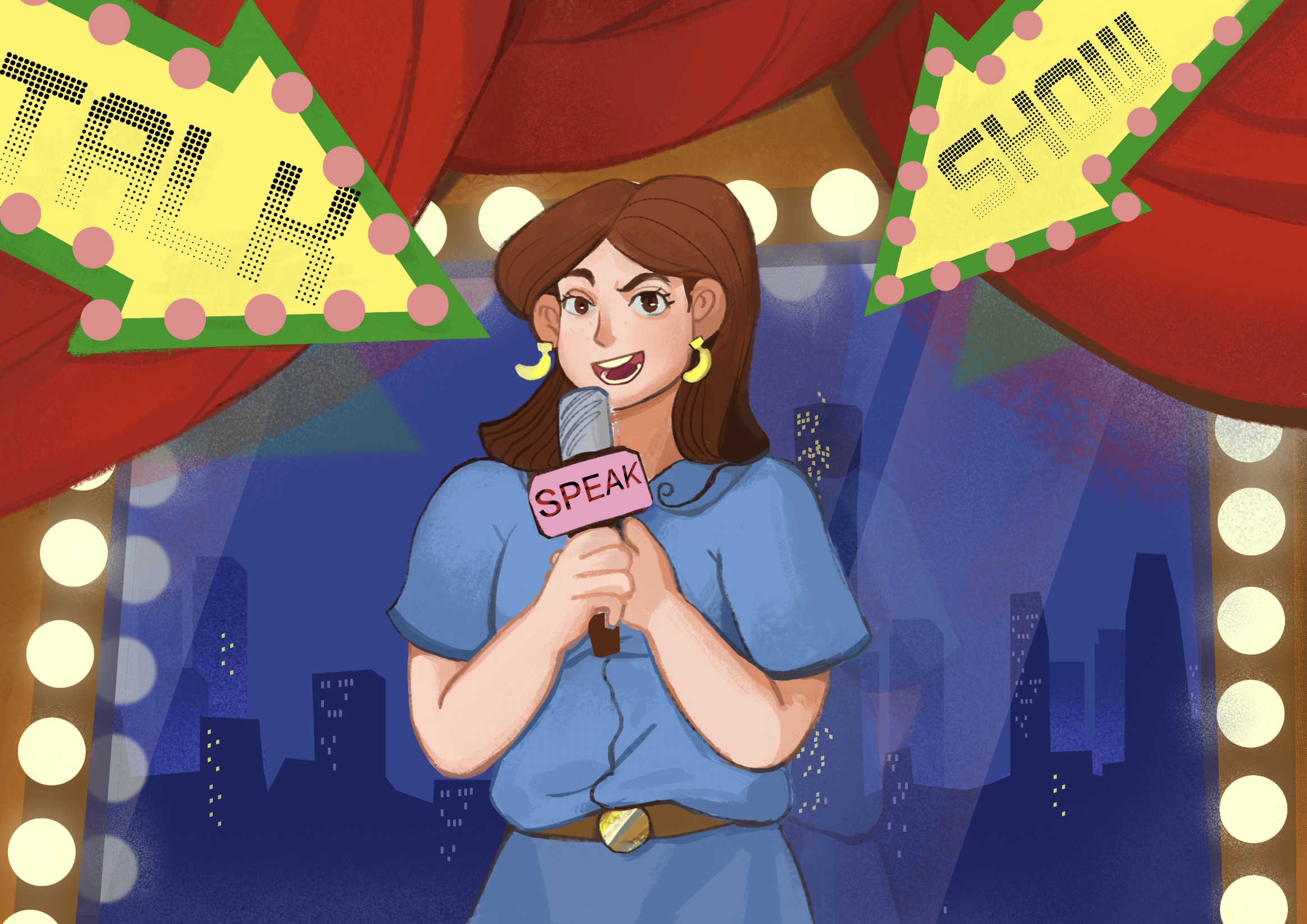In China, women stand-up comedians offend their way into the mainstream
Compared with traditional Chinese forms of comedy like sketch shows or crosstalk, Western-imported stand-up comedy is emerging as an art form that is more female-friendly. And women are taking advantage.

The spotlight is squarely on women comedians in China, thanks to Tencent’s popular stand-up comedy show Rock & Roast (脱口秀大会 tuō kǒu xiù dà huì). This past season, which ended last month, the women ruled: Yáng Lì 杨笠 took the internet by storm with her sarcastic attacks on the unearned confidence of men; Yán Yí 颜怡 and Yán Yuè 颜悦, twin sisters, called out the rampant body-shaming in Chinese TV; and comedy rookie Lǐ Xuěqín 李雪琴 turned her experience fighting depression and loneliness into stories that evoked laughter.
“The male performers didn’t meet my expectations,” Luó Yǒnghào 罗永浩, one of the guest judges, said in the series finale on September 23. “Yang Li and Li Xueqin deserve first and second place.” (Yang and Li ended up fourth and fifth place, respectively.)
Yang, a former scriptwriter, has been doing stand-up since 2018, but only recently caught her big break. (Above is her performance from Rock & Roast.) Her best-known bits incorporate stories of her own confusion in relationships and friendships.
“Not only are men adorable, but also mysterious,” one of her jokes begins. “They can look so mediocre, yet manage to be so confident.”
While Yang isn’t the first woman to speak about her personal life, few are so blunt about it. Her social commentary has found such a large audience that the phrase “so mediocre but so confident” went viral on Weibo. “The thing about Yang is that all men felt targeted, but no one can take offense because that would make her arguments all the more true,” said Lǐ Dàn 李诞, another of Rock & Roast’s judges.
But not all men share Li’s sentiment. Some, indeed, took offense.
Chǔ Yīn 储殷, a law professor at the Beijing-based University of International Relations, made two Douyin (Chinese version of TikTok) videos in response to Yang, both of which trended on Weibo. “How much above average does a man need to be in order to be confident in front of you?” Chu asks. “A man may be average, but you are likely ugly without makeup.”
A former variety show personality, Chu is known for his conservative social commentary. He also called Yang’s supporters “spoiled little princesses” held hostage by Rock & Roast’s commercial agenda, and said that Yang is only using her feminist persona for monetary gain.
Chu told The China Project that the Douyin videos were not directed toward Yang, but to the self-proclaimed feminists who flood social media networks using Yang’s language. “Yang’s performance is not disruptive itself, but a venting of anger,” Chu said. “Her words tap accurately into the needs of internet feminists, the most emotional and least tolerable group of people, who love to flaunt Western terminology while having no understanding of what’s going on in real life.”
Chu’s supporters — not exactly tolerable in their own right — have lashed out, too.
“It wasn’t until I saw the comments that I realized some people reacted aggressively toward my performance,” Yang said in an interview with GQ China. “It kind of scared me. I felt like I was dragged into a war I didn’t start.
“I’m only trying to be funny. In fact, in the same performance I also ridiculed women for being emotional, but I didn’t receive any hateful comments or threats from female netizens. Women have most likely become used to their stereotypical weakness being made fun of, while men have heard so few jokes like this before.”
For some observers, the fact that Yang’s remarks triggered such a strong reaction is reason enough for more jokes of that nature.
“Yang’s performance wasn’t radical,” said Ge Liang, a Ph.D. candidate in gender studies at King’s College London. “It was nothing more than a critique of heterosexual males who enjoy privilege in a male-oriented society in China.”

Even if Yang isn’t trailblazing, she’s riding a trend. In stand-up, more and more women are attacking the patriarchy. Yang, the Yan sisters, and Li Xueqin are just some of the women who have spoken on subjects such as the objectification of the female body, pressures to get married, body-shaming, midlife crises, and more.
Xiǎo Lù 小鹿, a female comedian signed to the Beijing-based label Dan Li Ren, recently addressed the highly publicized sexual assault scandal of JD.com founder Liú Qiángdōng 刘强东 during her national comedy tour. True Women (真娘们儿 zhēn niáng menr), which is her third comedy special and is centered around her reflections as a woman in comedy, has completely sold out in 11 Chinese cities.
Compared with traditional Chinese forms of comedy like sketch shows (小品 xiǎo pǐn) or crosstalk (相声 xiàng sheng), Western-imported stand-up comedy is emerging as an art form that is more female-friendly.
“In traditional Chinese comedy performances, stereotypes around women have always been a laughing point, be it women’s poor driving skills, vanity, or being overly emotional,” said Huáng Hè 黄鹤, a female comedian who has performed four years in both Chinese and English. “For a woman in comedy, it’s only natural to use her own life as material and respond in a humorous way.”
Huang’s interest in stand-up began after taking a comedy workshop in the U.S., where she was a college student. A petite Chinese woman in New York City pubs, Huang’s very existence challenged stereotypes. “The stand-up experience is so unique to me because of its potential to confront the existing stereotypes and start a conversation,” Huang said.
The skyrocketing popularity of Yang and Rock & Roast coincides with a blossoming of comedy venues in the past few months. “Before this year, open mic events rarely ever charged,” said Zhāng Yáng 张扬, a Beijing-based comedian and event organizer. “But this year, a 20 to 40 yuan ($3 to $6) cover is common due to high demand, not to mention how much the price of special shows has gone up.”
Perhaps the younger crowds that attend stand-up have also helped women. According to Guduo Media, which tracks data in the Chinese TV industry, the 19-to-35 demographic was Rock & Roast’s largest.
“I started to know Chinese stand-up from a video clip of Li Xueqin on Weibo and was immediately drawn to the format,” said Oscar Yao, a 24-year-old office worker. His growing interest in stand-up brought him into offline comedy clubs in Shanghai after the show aired.
As more people set foot into comedy clubs, the environment itself is also quietly evolving. “The Chinese audience has a stronger preference toward cleaner comedy that’s delivered in a more reserved, nuanced way compared to their Western counterparts,” Huang said. “Though offline stand-up remains a niche in China, there has been an increasing sense of pluralism in recent years.”
With all this growth and these changes, there is hope that more creative and courageous comedy will emerge to challenge stereotypes and push boundaries. In the future, there indeed may be comedians whose bluntness makes Yang seem far from radical. Men like Chu Yin should prepare themselves.






